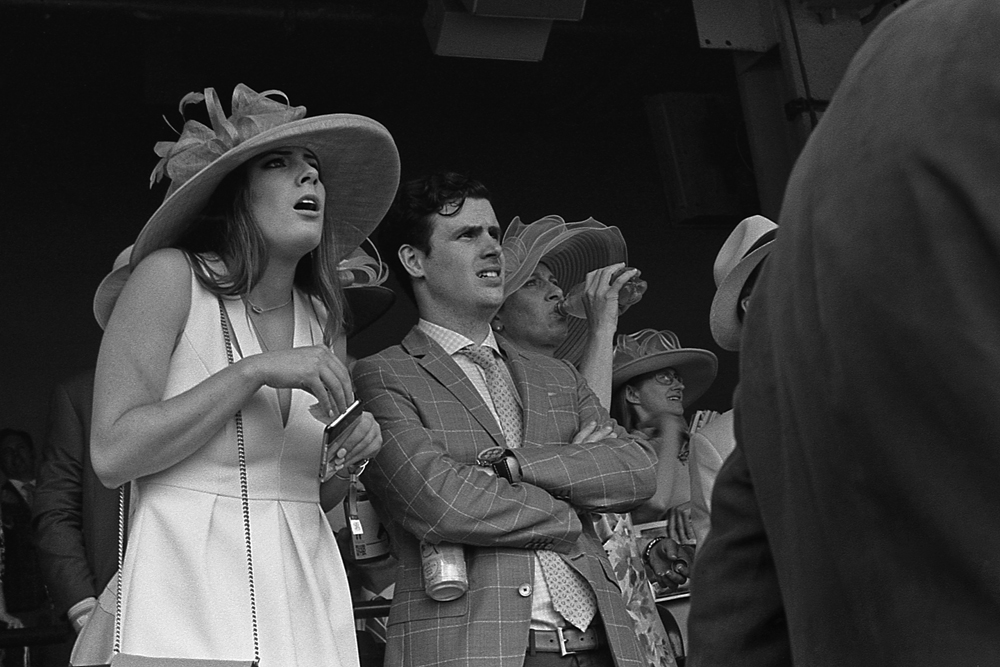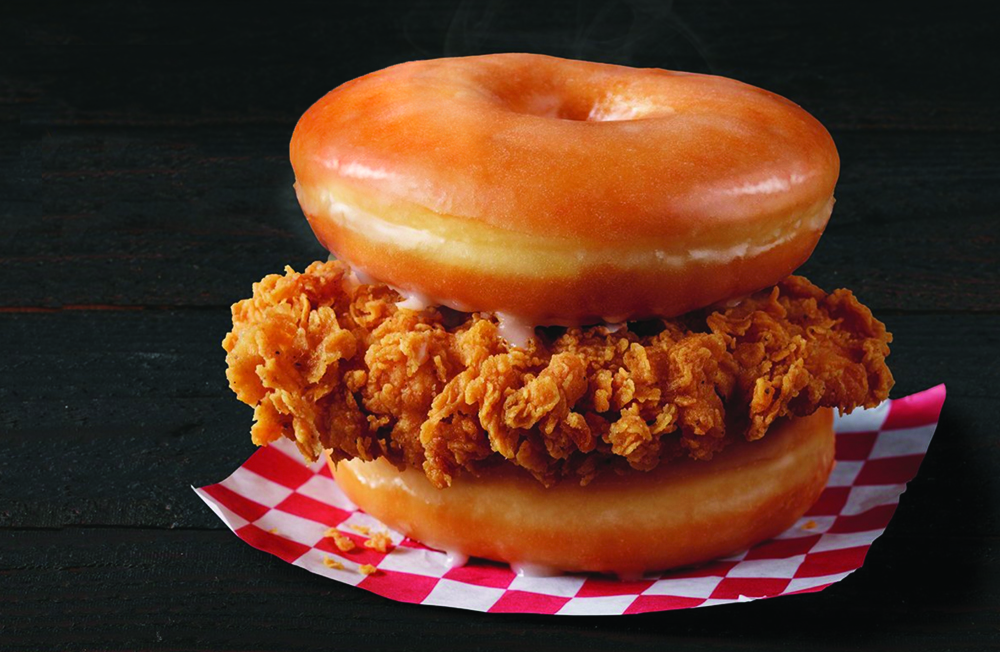Looking back at all the moments that had us go wtf, smh and omg.
Jump to:
A B C D E F G H I J K L M N O P Q R S T U V W X Y Z
______________________________________________________________________________________
By Dylon Jones
“There have been conversations in our city about changing the name of Louisville International (Airport) to the Muhammad Ali International Airport and that is an idea that we can get behind,” wrote Louisville Urban League president and CEO Sadiqa Reynolds in a 2017 Courier-Journal op-ed. Indeed, petitions to do exactly that had been circulating as early as 2016. In January, the city announced that the Louisville Regional Airport Authority (LRAA) had approved Mayor Fischer’s motion to honor the Champ, and many in the city celebrated. “It is a fitting testament to his legacy,” Lonnie Ali wrote in a press release. But at a community discussion Louisville Magazine hosted in partnership with the Muhammad Ali Center in June, some questioned if the renaming honored the airport more than Ali, who stood up for the rights of racial minorities, Muslims and anti-war activists. Can an airport really live up to a moniker like that? Or only strip it of controversy to benefit from the star power?
Either way, the Louisville Muhammad Ali International Airport seems to be on an upward trajectory, with this year on track to see a record number of passengers. A $100-million push to update everything from elevators to jetways will take place over the next three to five years, LRAA executive director Dan Mann told the C-J. From Feb. 28 to May 5, Allegiant Air will fly to New Orleans twice a week, and in April, American Airlines started traveling directly from Louisville to L.A. daily. This month, Southwest is adding a weekly flight straight to Fort Lauderdale and upping the number of flights to Baltimore, Chicago, Tampa and other cities. Catch us in the Sunshine State, y’all.

By Tatiana Ryckman | Photo by Andrew Cenci
Robert Barry Fleming became artistic director of Actors Theatre in June, but he’s no stranger to Kentucky. The director and actor has worked on television programs and award-winning theater (most recently in Cleveland) since he left Frankfort as a teenager, but he’s glad to be back home.
How it does feel to return to Kentucky? “When I left Kentucky when I was 17 back in 1981, if you had told me I would be happy to be back in Kentucky, I would have been like, ‘You are on something.’ But the reality is, it has been so powerful to come back home, and I think it’s like reclaiming a part of your fundamental self after venturing out into the world and discovering so many other parts of yourself.”

By Michael L. Jones
After 17 years of vacancy, south Louisville’s Colonial Gardens is being reborn. The former beer garden near Iroquois Park had been vacant since 2003. But in July El Taco Luchador opened a new location on the site, followed by Union 15, a pizzeria and taproom, in August. Biscuit Belly plans to open in March 2020.
The loss of establishments like Colonial Gardens is still keenly felt in this proud South End neighborhood. Except for a handful of restaurants and the chains littering Dixie Highway, there are not many places to get a sit-down meal in the South End, so the rebirth of Colonial Gardens — a place that still holds memories for some locals — feels important. It’s so nostalgic that people have been buying memorial bricks bearing the names of loved ones or momentous dates to be installed on the property.
German immigrants Carl Frederick and Minnie Senning opened Colonial Gardens as a beer garden and restaurant in 1902. The couple passed it on to their son, William, in 1920, just in time for Prohibition. William adapted to the times by transforming the property into Louisville’s first zoo. In 1939, the property was sold to B.A. Watson for $15,000, and he renamed it the Colonial Bar and Grill. That was the beginning of a downhill slide, as changing musical tastes began to make old-style dance halls obsolete. There was a psychedelic rock club there in 1968, when Marlene Yager moved to south Louisville. “I never went there, but all the young kids did,” the 80-year old says today. “After it closed, the building just started wasting away. There was water in there up to my knees.”
A group of local residents had Colonial Gardens landmarked in 2008 to prevent the site from becoming just another Applebee’s or Walgreens. But that landmark status made it harder to develop the site, especially as the structure continued to decay. In 2013, metro government purchased Colonial Gardens for $430,000 in an effort to jump-start redevelopment. Underhill Associates, the only developer to bid on the project, bought the property for $1, with a promise to invest another $5 million in renovations. However, the original property had been split into three parcels, and two of them were rented, meaning the developer had to wait three years to take possession of the final parcel occupied by a Little Caesars.
Once complete, the high-end food court will house four restaurants sharing a 10,000-square-foot patio, harkening back to Colonial Gardens’ roots. Underhill Associates built three new buildings that mimic the style of the original structure, which developer Jeff Underhill says was so badly damaged that his company will spend an additional $1 million to bring it back to life. The patio is decorated with concrete zoo animals and has a replica of a trolley and a statue of Elvis, who reportedly performed at the site. There is also a South Louisville Hall of Fame near the restrooms that features posters and photographs from the property’s past. Underhill says local residents have started cleaning out their basements looking for things to donate.
Yager has enjoyed several trips to El Taco Luchador. She has not tried Union 15 yet but has heard good things from her neighbors. Still, she can’t help thinking about what might have been. “I always thought Colonial Gardens looked like a big barn,” she says. “I would have liked to have seen something with a little more pizzazz. My neighbors are all happy about the new restaurants. They tell me I’m a grumpy old woman, and maybe I am.”

By Dylon Jones | Illustration by Shae Goodlett
In recent years, John Schnatter, the eponymous founder and face of Papa John’s, has been busy rolling a pizza cutter through the brand’s reputation. In 2017, he blamed lagging sales on NFL athletes protesting police brutality. The following year, he said — well, you know what he said. Papa John’s stock price plummeted, and U of L took the company’s name off Cardinal Stadium. Schnatter was removed as chairman and scrubbed from promotional materials, though he remains a large shareholder. One has to wonder if the company considered dropping the name “Papa John’s” altogether. But what would they change it to?
One option: Papa Shaq’s.
Earlier this year, NBA Hall-of-Famer Shaquille O’Neal became the first black board member at Papa John’s, bought into nine franchises in Atlanta and replaced Schnatter — who has moved onto a shaky PR redemption tour — as the face of the company. Why? Well, he said he wanted to help cultivate an inclusive culture at the company. But the $8.25 million, three-year endorsement deal couldn’t have hurt.


It would have been easy to gorge on the Harvey’s Cheese toasties — grilled cheese so good it deserves a name that doesn’t imply Kraft singles. Or to fill up at Foko, led by the former Con Huevos chef. But we — three editors and photographer Chris Witzke — practiced some restraint, if you could call it that, grazing our way through the food counters at the newly opened Logan Street Market like horses out at pasture with no end in sight. At least the three-hour lunch felt that way.



By Anne Marshall | Photo by Chris Burgett
Each day begins as a rough sketch. There are encampments to visit, a list of individuals to check up on. But in homeless outreach, those you assist become the compass, redirecting plans on the spot. So it goes on a cold Friday morning this fall. Christen “Tiny” Herron and Carrie Dorton, two outreach workers, stand outside the Lord’s Kitchen just south of the University of Louisville’s campus, talking with men and women who’ve come bundled in layers for a meal.
Herron and Dorton pass out socks and bus passes, then remind a young man of an upcoming appointment with a caseworker who’s finding him housing. They agree on their next stop: a man living at a nearby abandoned property. But a young woman with dark hair tinted sapphire walks up in tears. She lifts a pink Mickey Mouse duffle bag to waist-height. “Let me see her,” Dorton says, tenderly.
The woman, whose name we are not including, unzips the bag, pulls out a gray jacket and carefully scoops up a shivering Chihuahua-looking dog named Goldie. The dog’s legs are as thin and stiff as pencils. Her ribs look like gills as she struggles to breathe. This woman and her dog have been a pair for years. After the sudden death of the woman’s husband, Goldie pressed against her owner, giving relief from the loneliness and soft, eager love when their time on the streets turned violent.
Maybe it’s cancer. Whatever it is, Goldie has not been eating, and her brown eyes strain, tired and pained. “This dog saved my life,” the woman whispers through sobs so heavy she’s gasping.
“You’ve been a good mama to her,” Dorton says, rubbing the woman’s back.
Goldie and her owner are now the morning’s priority.

David and Betty Jones in Louisville in the early 1950s.
As told to Josh Moss
Betty Jones died Aug. 16 at age 86, and her husband, Humana co-founder David Jones Sr., died a month later on Sept. 18 at age 88. Three of their five children — David Jr., Dan and Carol — shared stories about their parents.
David Jr.: “There was a rocking chair in the living room, and I have a distinct memory of Mom reading to me. There was a book called Perri about a squirrel. Reading was a fact of life in the house from the very beginning.”
Dan: “One of the first books she ever read to me was Peter Rabbit. I still have that whole set of Beatrix Potter books sitting on my bookshelf in my room in their house off Brownsboro Road. That’s one of the things I’m keeping as I clean it out.”
Carol: “I was always throwing a football with my dad.”
Dan: “I wanted to be a receiver, so he’d throw me these long passes and I’d make these diving catches.
“My dad was a boxer when he was young, and he had these very powerful wrists and forearms. Whenever we would get splinters, he would dig them out with a needle — these big hands holding this tiny needle. And then he would apply this old-fashioned antibacterial. It wasn’t a gentle process.”

Activist Suzy Post died in January at age 85.
From a piece that happened to run in January: “I have just loved life. It is gonna piss me off to have to die before I really want to.” Read more.
Longtime Jack’s Lounge bartender and the Kentucky Bourbon Cocktail Book co-author Joy Perrine died in March at age 73.
From February 2016: “Some bourbons are very vanilla, caramel, sorghum and molasses. Others are fiery and peppery. Others are citrusy. Some you get flavors of cherries and raisins. You get the spices, the cinnamon and nutmeg. Some I get pineapple. I can get coconut. I can get banana. On a really cold night, to me, there’s nothing better than being in front of a roaring fire with a nice little glass of bourbon in my hand.”
Former Louisville Ballet director Alun Jones died in April at age 82.
From September 1980: When people marvel at his luring Mikhail Baryshnikov to perform with his company, he grins and says simply, “I just asked him.”
Woody Porter of A.D. Porter & Sons Funeral Home died in June at age 72.
From September 2012: “The doctor told me each step I take could be my last. All the sudden, the other (artery) could close and — boom! — I’m just gonna have a massive stroke and die. When he told me that a little over a year ago, for about two weeks I was sort of depressed. Then I said, ‘I will not allow myself to live in fear.’ Why should I fear dying?” Read more.
By Josh Wood
No, Louisville is not the next Denver: Weed is still very much illegal in Kentucky. But Jefferson County took a huge leap toward relaxing its attitude on marijuana when County Attorney Mike O’Connell announced in August that he would no longer prosecute possession cases that involved one ounce or less of marijuana when that was the only or most serious charge. It’s not exactly decriminalization, but it’s pretty close, and the move came after the Metro Council passed an ordinance that told LMPD officers to make pot possession their lowest priority.
The shifts on marijuana policy came after a Courier-Journal report in January showed that black drivers pulled over by LMPD were arrested for marijuana at six times the rate of white drivers. Meanwhile, African-Americans accounted for two-thirds of all marijuana charges in the city in 2017. “For me to truly be a minister of justice, I cannot sit idly by when communities of color are treated differently,” O’Connell said in announcing the change.
While it may be too early to tell how big of an impact there might be, activists say it’s a step in the right direction. “I think it’s helped out a lot of people across the city,” says Jaime Montalvo, the founder of Kentuckians for Medical Marijuana. “I know in my particular case, it may have protected me from being searched and eventually charged with a bunch of different things, because now the smell alone isn’t enough to get a search warrant.”
Montalvo, who uses marijuana to manage symptoms and pain from his multiple sclerosis, was arrested for growing marijuana in 2012 after a police dog hunting a bank robber in his neighborhood alerted on Montalvo’s home. The arrest saw Montalvo lose custody of his child for six months, and he was put on probation for five years.
Matthew Bratcher, executive director of Kentucky’s chapter of the National Organization for the Reform of Marijuana Laws, hopes the reforms will lower arrests. “If the cops know it’s not going to go anywhere, chances are they’re going to be even less likely to arrest somebody,” he says. “When other cities have implemented similar policies, you do see a dramatic drop in the racial disparity of these arrests, which is always what you want out of these kinds of policies.”
Activists hope the moves in Jefferson County will spur changes elsewhere in the state. Lexington is seen as a potential candidate for decriminalization. Paducah — right across the Ohio River from Illinois, where recreational weed will be legal on Jan. 1 — is another. The policy changes in Louisville, Montalvo says, “will help communities see that it’s not the end of the world; the sky isn’t falling. By all intents and purposes, we’re decriminalizing something without allowing people to go and purchase it in a legal store.”
By Josh Wood
When a law requiring Kentucky public schools to prominently display the words “In God We Trust” went into effect this year, some school districts got creative in their compliance. In Fayette County, schools posted framed copies of dollar bills. In Jefferson County, schools put up posters describing how the words first appeared on U.S. coins in 1864 “largely because of the increased religious sentiment existing during the Civil War” and only later became the national motto. With critics of the law seeing it as part of an effort by religious conservatives to break down the division between church and state, creative displays were viewed as a rebellion. Fayette County’s dollar bills generated statewide and national attention, leading Gov. Matt Bevin to say the district was trying to “undermine” the intent of the law. Republican state Rep. Brandon Reed of Hodgenville said he was disappointed to see Fayette County looking for “silly loopholes” to the bill he introduced. In Reed’s LaRue County, the birthplace of Abraham Lincoln, schools put up images of pennies.
By Sara Havens
It was just another day when I walked through the door of Insider Louisville’s office inside the First Trust Centre downtown. But when I walked out eight hours later, an air of uncertainty permeated the hallways.
That day was Thursday, July 25, and for most of the morning and early afternoon, my fellow writers — four Louisville journalists (there were six of us total, but one was on vacation that week) — went about our jobs as we normally did, publishing about one article an hour starting at 5:45 a.m. As culture editor, I had a few arts features and event roundups to work on, and I was expecting at least two pieces from our small but stable pool of freelancers.
My boss mentioned she’d be out that afternoon for a board meeting, but that hoisted no flags. Ever since Insider had become a nonprofit in late 2017, our board met regularly in the conference room. After their meetings, they’d always stop by and say hello. On this day, nobody did.

By Dylon Jones | Illustration by Shae Goodlett
The most foul-mouthed kid in the state couldn’t have come up with more outlandish things to say about teachers than soon-to-be-former Gov. Matt Bevin. Remember that bizarre statement linking the teacher protests over pension reform to child molestation? Bruh.
We don’t have the data to say for sure that teachers as a voting bloc knocked Bevin out of office, but the pension debate undoubtedly played a big part in upping turnout to the highest it’s been in a gubernatorial election since 1995, earning Andy Beshear a razor-thin 5,189-vote win. And the narrative of teacher backlash toppling a Republican from power in a state that voted overwhelmingly for Trump has such a delicious sense of poetic justice that it’s hard to resist. So, with that in mind: Matthew Griswold Bevin, you’re expelled.

By Jenni Laidman | Photo by Mickie Winters
2019 was a giant year for Bernheim Arboretum and Research Forest as it celebrated its 90th anniversary. Literally. Giants Mama Loumari and her youngsters, Elina and Nis, moved to the arboretum with the help of Danish artist Thomas Dambo, who built the supersized trio from recycled materials, including some Louisville Sluggers and bourbon barrels. Fans of the giants stormed the Bullitt County nature preserve to say hi. Forest visitors tripled, and, by year’s end, are expected to top half a million. Giant lovers from every state, every occupied continent and some 22 nations — Australia trails only Canada in its number of giant guests — stopped by to meet the big visitors. And the dividends for Bernheim have been giant as well. Donations are up, memberships are up and gift-shop revenue jumped 90 percent. In fact, visitors so loved the giants that, when scoundrels made off with Elina’s jewelry in March, Bernheim guests brought her more. They continued to bedeck her stick tresses with pink bows and her bracelet with beads and rocks late into the year. The timing of the giants’ visit couldn’t have been better in another way, as they create new allies for the conservation organization, which has squared off in court against LG&E’s plans to extend a 12-inch natural-gas pipeline across a three-quarter-mile stretch of Bernheim’s newest property. So far, the giants haven’t joined the fray against the utility. Loumari, who’s “pregnant,” has other things on her mind at the moment. But LG&E may want to worry about making enemies of such dizzying proportions.

By Josh Wood | Illustration by Shae Goodlett
Moscow Mitch. The name rolled off the tongue, sticking to Mitch McConnell like no other jab had over his 35 years in the U.S. Senate. Putin’s Mitch may have conveyed the same message, but it was no Moscow Mitch, a name critics pinned to McConnell following his continued rejection of bipartisan bills to fund election-security measures — as intelligence officials continually warned of Russia’s interference.
Soon after the nickname debuted over the summer, the Kentucky Democratic Party started branding everything from Russian Cossack hats and copper Moscow Mule cups to red T-shirts and koozies with the words “Just say nyet! to Moscow Mitch!” The merch pulled in more than $500,000.
Louisville’s — and perhaps America’s — most powerful politician has usually rolled with the punches, even seeming to welcome them at times. But Moscow Mitch and the caricatures of the bespectacled senate majority leader wearing an ushanka bearing a hammer and sickle went too far: He condemned the taunt, calling it a form of “modern-day McCarthyism.”
“Other than money in politics, the one thing I think that Senator McConnell probably holds dear to his heart: He’s a hawk who believes in the partnership between the U.S. and old Europe, who points to his record fighting against Russian influence throughout the years, throughout the decades,” Courier-Journal political reporter Phillip Bailey told MSNBC in August. “So he’s definitely taking this more personally.”

As told to Josh Moss | Photo by Danny Alexander
Last month, Whitney Austin was in Frankfort advocating for a bipartisan bill known as “red flag” that would allow court-approved extreme-risk-protection orders to temporarily remove guns from individuals who are a threat to others or themselves. As of press time, the bill was scheduled to be filed in time for the General Assembly session next month.
Austin, who is 38 and lives in Louisville, spoke to us about the Fifth Third shooting, and her goals for Whitney/Strong, which she’s now focusing on full time.
By Anne Marshall
In late 2018 and the early days of 2019, city leaders often rejoiced the $1 billion in investment headed to west Louisville neighborhoods. Development on one of the most expensive projects, though — an $82 million Passport Health Plan headquarters and “health campus” at 18th Street and Broadway — has stalled. It is now just a steel skeleton to behold. In May, Passport, a nonprofit Medicaid managed-care company, announced that Evolent Health, a for-profit health-management company, would buy a 70-percent stake in Passport. At the time there were assurances that the headquarters would possibly, maybe, conceivably proceed. Still, we wait.
The Evolent acquisition has not yet closed. And Passport is expecting an announcement this month from the state on Medicaid managed-care contracts for the next five years. (Under the Bevin administration, Passport worried that cuts to its Medicaid business could push them into bankruptcy, according to the Courier-Journal.) As for the headquarters, Ben Adkins, a Passport spokesperson, says, “We have made the decision to seek an outside partner to help develop and manage the site moving forward, allowing us to focus our people and resources on coordinating care for our health-plan members. Our developer search is underway.” Does this mean the site will remain a health campus of sorts? Or morph into something else? “It’s still too early in the process to speculate on the influence a developer would bring to the project,” Adkins says.
By Anne Marshall
With a $5-million gift from Norton Healthcare in October, the Louisville Urban League’s track officially became the Norton Sports Health Athletics & Learning Complex. LUL CEO Sadiqa Reynolds says the day Norton stepped up she was “over the moon.” So far, she has raised nearly $25 million for the west Louisville project that will cost between $35 and $40 million. (She wants to build the complex debt-free.)
This year, LUL launched its “Run With Us” campaign, urging individuals to support the project with a $5,000 pledge, earning each donor their name on one of the complex’s 4,000 seats. Another milestone? Reynolds says she recently signed a deal with Kiefer USA to supply the track surfacing, the same one that athletes will run on in the 2020 Summer Olympics in Tokyo. Plans call for the facility to act as more than just a host site for meets. It will be a learning hub, an entertainment venue and, hopefully, a magnet for retail and a hotel. Can the complex bring economic development to a neighborhood that’s been neglected by public and private investment for decades? It’s a massive undertaking, and Reynolds feels that.
In recent years there has been so much investment announced for west Louisville, one such project being the proposed Passport headquarters at 18th Street and Broadway that is now on hold. Does this put pressure on you, to show that commitment for the track is real? “As a black woman running an organization that primarily serves the black community — and of course we serve everybody who needs us — but the level of pressure has been real from the beginning. I mean, I’ll tell you, there have really been days when I was just like, ‘Wow, what am I doing?’ Because people have ideas, people want to do great things, but to actually be in the middle of this and having my whole full-time job of running the Urban League, being a mom, trying to have a little bit of a personal life — it’s the pressure of everything about what happens in poor communities always seeming to fail. I have all of that on me.”
Are you pleased with where you are in terms of fundraising? “It’s been tremendous. I should be celebrating. But the challenge with celebration is I’m not done. So it’s hard. I’m proud of our city, I’m proud of folks for stepping up. But I am — I have to tell you, I am disappointed in the number of corporations that have not come forward to help us out.” (Ed: In 2018, the James Graham Brown Foundation put $3 million toward the project, and LG&E has pledged $100,000 as the track’s concession sponsor. Nineteen companies have comitted a total of about $1 million. Metro government has committed $10 million in the form of a bond.)
So you’re hoping for more of the bigger companies in Louisville to pledge support? “Absolutely. And the ones that have foundations to step up and help. You know, if everybody does their part. Where we are really at this point: We need $13 million more in philanthropy and we’re done. But we do need $4 million in this calendar year.”
Why is that? “Because this project is in large part being driven by access to new market tax credits and we’ve got to have a certain amount of money pledged and committed and cash in hand to move it forward.”
Do you have a definitive deadline on when this has to be built? “We’re going to be done at the end of next year, come hell or high water. Done. The outdoor track will be done summer 2020. Then by the end of 2020, the entire project is complete, doors open. The next big part, you know, there’s the hotel and the other bigger retail, but that’s a separate thing. I’m hoping that when it’s over, people will go, ‘Man, this is better than I thought.’”


By Sara Havens
It has been quite the year for Louisville drag queen Jade Jolie — from appearing in a Taylor Swift music video to being mistaken for said pop icon by a legendary movie star at an awards show.
Jolie, the drag persona of Joshua Green, came to Louisville shortly after finishing in eighth place on the reality show RuPaul’s Drag Race in 2013. She has since become part of the esteemed drag queen and drag king lineup known as the Play Mates at Play Dance Bar in Butchertown. “She has been a mentor to several local queens, many of which are up-and-coming,” Play owner Micah McGowan says, adding that she “continues to hone her craft.” During her time at Play, she has perfected the Taylor Swift look. She is always a crowd favorite when she commandeers the stage to perform “Blank Space,” “22” and, of course, “You Need to Calm Down,” which is the video Jolie appears in along with a handful of other notable drag queens from across the country. Not only is she right alongside Swift in the video, but Jolie has posted many behind-the-scenes moments with Swift from both the video shoot and the MTV Video Music Awards in August, the site of the infamous mistaken-identity moment. Onstage, a somewhat oblivious John Travolta presented the Video of the Year Award to Swift (and the drag performers) for “You Need to Calm Down.” Our girl Jolie was one of the first to take the stage, and Travolta appeared giddy in her presence and offered up the Moon Man trophy to her, presumably thinking she was Swift. The next day, “Jade Jolie” was abuzz on social media. “Jade is the No. 1 Taylor Swift impersonator in the world,” McGowan says.
2019 got off to an unusually bad start at historic Santa Anita Park in California, with 10 horses suffering catastrophic injuries in January. That’s about the time the mainstream media picked up the story, and, over the course of the year, horse deaths became the prevailing national racing story, including after Mongolian Groom took a bad step in the Breeders’ Cup Classic Nov. 3.
Last month, a coalition of leadership representing all of the major tracks formed to address safety issues regarding medications, track surfaces and whip use. During a press conference at Keeneland, Churchill Downs president Kevin Flanery said, “These reforms are vitally important for our industry.”
For many people outside the industry, the future of the sport has become a binary proposition: reform or abolish. I’m all for the former, but it helps to know the facts.

Photo by Joon Kim
Not that you could tell from the puffs of yellow and purple smoke, or the nonstop chants and horns, or the stadium’s record crowds, but Slugger Field — charming as it is — isn’t meant for soccer. So just imagine the energy in the stands during Louisville City FC’s first game in the team’s new stadium next spring. Throughout the year, we’ve seen the steel take shape along the highway in Butchertown. Adding to the excitement was the announcement of a pro women’s team that will share the new home.
In late summer, workers rolled out the new turf. The 2020 grass is looking greener already.
By Bruce Allar
One 2019 lowlight hit the city right in the pocketbook: the announcement by Mayor Greg Fischer in January that an additional several million dollars — precipitated by a rising pension bill from the state — would be needed in the 2019-2020 budget to be passed by July 1. Eventually, with Fischer’s suggestion to increase the insurance-tax rate getting little support, and after some heated debates, $25.5 million was shaved in a multitude of departments and programs.
A visible symptom of this budget fever has been the ongoing, temperature-rising debate over future operations of Louisville’s 10 municipal golf courses. While the courses combined returned a profit of nearly $35,000 to the city in fiscal year 2016, they’ve been operating below par since. They reportedly lost nearly $770,000 in fiscal year 2018 and were, according to preliminary figures, more than $1 million in the red for 2019. In response, earlier this year Fischer sought bids from outside contractors to run the courses and, potentially, close some of the underperformers. This prompted both golfer grievances and a Metro Council counterproposal that would keep the properties under Metro Parks control by raising greens fees. New contracts for course operations are due to be in place by Jan. 1, so expect to see more golf in the news.
It’s easy to get lost in the weeds (or should I say the rough) of these deliberations. The current system, where a different PGA-certified professional controls operations at each course, was under scrutiny. So was the way those professionals report their expenses and revenues back to the city. As a golfer who plays these “muni” courses, I see the need to tighten operations. But keeping a teaching professional at each course really serves the public: These pros do so much to introduce and advance a lifelong sport to the non-country club crowd.
Apparently, Metro Council agrees. In October, it voted 22-1 to retain pros at each course and raise greens fees by $5 to make up for revenue shortfalls. When I asked Metro Council member Brandon Coan about it, he said, “I think Metro Council wanted to give Metro Parks and golf courses an opportunity to keep things the way they were if it could be financially sustainable. And I thought it was worth that chance.”
Coan’s district includes Cherokee Golf Course, which runs alongside Grinstead Drive and Cherokee Parkway and, obviously, the adjacent Cherokee Park, a gem in the local parks system designed by the firm of Frederick Law Olmsted. Coan’s wife, Summer Auerbach, is on the board of the Olmsted Parks Conservancy, which has gone public with an offer to repurpose the course’s land, turning it back into park space with walking trails, a pond for boating and fishing and other amenities, and transforming the clubhouse into a restaurant with a patio. Despite the potential conflict of interest, Coan called it “a very visionary plan,” and said that, in the event the golf course continues to lose money, “At very least there is a Plan B, where Olmsted will come in and pay to maintain it and pay to do a master plan.”
As a golfer and a parks advocate, I ask: “Why wait?” Let’s say goodbye to the Cherokee links. Yes, it’s the oldest public golf course in Louisville, dating to 1895. And no, while costing the city more than $100,000 in fiscal year 2019, Cherokee is not the biggest loss leader. That double bogey goes to Sun Valley, in Valley Station, which lost more than $260,000.
But here’s the thing: Cherokee has long been outdated as a place to play the game. When clubs had hickory shafts and balls would hardly fly 200 yards, Cherokee’s nine holes might have been considered a test of a golfer’s total game. Today, it’s short yardages and the trick shots required to navigate slopes fit for a ski run make it more of an arcade game.
And here’s the other thing: Contrary to the opinion of many, golf is not just an elitist pastime for executives and politicians hopping on private jets to exclusive clubs. The game is accessible for players of more modest means, as well. Equipment is costly, but it lasts several years. And golf can be played well into retirement at almost any skill level. It is enjoyed by more Louisvillians than you might think, many of them on fixed incomes. Keep the South and West End courses, including Sun Valley, available for players in those areas.
Highlands residents still have highly profitable Seneca Golf Course, and most in that neighborhood can afford the higher fees at non-municipal public or private courses. I’m sure Cherokee would be missed, but not by many, and not by me.

By Brandon Quick // Photos by Joey Harrison
To understand the controversial result of the 2019 Kentucky Derby, it helps if you were at Churchill Downs some five months earlier — the day after Thanksgiving, to be exact.
As darkness cloaked the Downs for the 12th and final race of that chilly and sparsely attended Black Friday card, an interesting story was unfolding in the aftermath of an otherwise common maiden race (horses who have never won). Presidential Tweet and New Colossus crossed the wire in first and second place respectively that evening, with another length or so back to Laser Loop in third. To the naked eye, there was nothing unusual about the race, though it was closely contested, and not all the runners maintained a perfectly straight path, which again is to say that it was completely normal.
In the ensuing moments, the “stewards’ inquiry” sign was posted, and the three-headed monster consisting of Kentucky Horse Racing Commission stewards Barbara Borden and Brooks Becraft and track steward Tyler Picklesimer set about righting a perceived wrong. Their decision was as swift as it was baffling. The top two finishers were both disqualified for separate and, dare I say, inscrutable infractions with less than an eighth of a mile to run. Thus, Laser Loop, the third-place finisher, was declared the victor despite never having run better than third at any point in the race and never truly threatening the top two. I’ve seen tens of thousands of races, and it was the worst stewards’ decision I’ve ever witnessed. So bad, in fact, that Ian Wilkes, trainer of Presidential Tweet, recalls the events with stunning accuracy nearly a year later, right down to the jockeys involved, positions of the horses and why it was a bogus decision.
Keep in mind that Wilkes, an accomplished and respected trainer, had 515 starters in 2018, and 426 in 2019 as of mid-November, according to Equibase stats. He had no idea why I was calling about Presidential Tweet, but within seconds was able to give a flawless description of the proceedings before a simple lament: “It was a bad call, and I didn’t agree. Most (disqualifications) are black and white.” Wilkes is right. Most racing DQs are fairly justifiable, even if they spark the ire of losing bettors and trainers.
Which brings us to Maximum Security in the 2019 Derby and the most controversial and historic disqualification of all time.
With chief steward Borden and underlings Becraft and Picklesimer again in position to take the road less traveled by stewards before them, there was little doubt in my mind that they would.
To be completely fair, there is almost universal acknowledgement that Maximum Security interfered with War of Will in the stretch, nearly causing a spill, and many respected trainers (including Wilkes) and pundits agreed with the Derby DQ. But as racing genius and former Washington Post columnist Andrew Beyer pointed out: “Stewards disqualify horses when a foul has clearly affected the outcome — or when it’s so egregious that it eliminates other horses from contention.”
Maximum Security’s transgression didn’t clearly affect the outcome, as it’s a matter of pure speculation whether or not War of Will’s eventual sixth-place effort would have been good enough to crack the top three if not for the interference. What’s worse, declared-winner Country House — much like Laser Loop — had no real claim to the victory. The stewards were willing to insert themselves into the action in ways few other racing officials would.
You can go to the track the rest of your life and probably not see another double disqualification or Kentucky Derby winner taken down.

Photo by Mickie Winters
At music festivals over three consecutive weekends this fall, Louisville saw Marilyn Manson (pictured), Guns N’ Roses, Little Big Town, Hall & Oates, Ice Cube, Luke Bryan, Slipknot, Robert Plant, Rob Zombie, Foo Fighters, Joan Jett, Staind, ZZ Top, Keith Urban, Disturbed, Leon Bridges, Edward Sharpe, Zac Brown Band, Alison Krauss, the Flaming Lips, Sum 41, Tim McGraw, Godsmack, Dwight Yoakam, John Fogerty, Bret Michaels…
Dude-heavy, but fun.
By Adam K. Raymond
Budget cuts to the bone
How does a city make up a $35-million budget shortfall? Depends whom you ask. Mayor Fischer wanted to raise Louisville’s insurance-premium tax to cover the city’s increased pension liability. Metro Council did not. After voting down Fischer’s plan, city lawmakers took a scalpel, and in some cases a chainsaw, to portions of the city budget. When it passed over the summer, the final budget included cuts to libraries, emergency services and several public pools. Fischer didn’t like the budget, but he signed it anyway. And we get to do it all over again next year.
The Oxmoor Open
The noise, the light, the drunk drivers, the drunks with drivers — all reasons why the proposed Topgolf at Oxmoor Center has been a source of suburban strife for the past year and a half. The controversy over the proposed high-tech driving range looked to be over in November 2018 when the Metro Council gave its approval to replace the shuttered St. Matthews Sears with the 65,000-square-foot Topgolf. But a new lawsuit from the mall’s neighbors last winter put the brakes on construction until June. That’s when a judge gave what appeared to be the final thumbs-up to Topgolf. But as we prepare to enter the third calendar year of the Topgolf drama, balls are still not flying at Oxmoor.
U of L’s big bet
Jewish Hospital was running on fumes this summer, weeks away from ending its heart-transplant program and not far from shuttering completely, when the University of Louisville threw the beleaguered hospital a lifeline. “Jewish Hospital is just too important to this community for us not to act,” U of L president Neeli Bendapudi said in August upon the announcement of a major deal to rescue Jewish and its affiliated facilities. It’s not coming cheap. Along with tens of millions from private foundations, the state will give the university a $50-million loan to complete the deal. That is, as long as lawmakers in Frankfort sign off.
Humana downsizes
Insurance giant Humana, one of the city’s largest employers, announced plans in late October to cut 800 jobs from its nationwide workforce. The firm, whose CEO made 231 times the median employee in 2018, has said the layoffs are a part of ongoing cost-cutting efforts that have depleted Humana’s workforce. Once everyone is out the door at the end of 2019, Humana, which once employed 50,000 people nationwide, will have a staff of 41,000.
One Park, many complaints
Developer Kevin Cogan is trying to transform the lot at Grinstead Drive and Lexington Road into One Park, a mixed-use development that drew out the NIMBY cohort this year. Even after the rendering was revised downward, from three towers to one and from a maximum of 34 floors to 18, residents still stuck signs in their yards reading: “One Park. Too Big. Too Tall.” The city sided with Cogan in October and approved the complex, which includes an 18-story tower, plans for a hotel and thousands of square feet of retail space.
By Josh Wood
In March, governor Matt Bevin signed a slew of anti-abortion bills into law that would have made abortion all but illegal in Kentucky if the American Civil Liberties Union hadn’t stepped in with suits that resulted in two laws temporarily blocked. We spoke to Heather Gatnarek, staff attorney at the ACLU of Kentucky, about where things stand.
Where are those bills now? “We currently have a pending lawsuit that challenges two of the laws that were passed by the General Assembly this year. One would ban abortion after approximately six weeks of pregnancy, and then the other would ban abortion if the patient’s reason for abortion was, in whole or in part, the race, sex, gender, color, national origin or disability status of the fetus or embryo.
“There are a few other bills that passed. One is something that we refer to as a ‘trigger ban.’ It’s not in effect right now because what the law says is that if the U.S. Supreme Court overturns Roe v. Wade in whole or in part and gives back to states the right to prohibit abortions, then abortions would immediately be outlawed in Kentucky.
“The general assembly also passed a law that claimed to make some changes to how the clinic reports abortions. That law is in effect.”
If the ACLU’s challenges fail, what does that mean for Kentucky women? “Our challenges won’t fail because those are sort of patently unconstitutional laws, and that’s what every single court is finding. As each of these are being introduced and challenged in states across the country, that’s what the courts are finding. These aren’t close calls.
“But if you’re asking me to imagine a world down the road where courts change their mind about that — if that were to happen, what it would mean is that patients would be prohibited from accessing abortion in a couple of different ways. The six-week ban would require that there be no abortions after a quote-unquote heartbeat is detected, but that is generally detected at approximately six weeks using ultrasounds, so patients would not be able to access abortion after six weeks — at all, nobody, for any reason.”
And most abortions happen after six weeks, right? “Approximately 90 percent take place after six weeks.”
Now that Bevin lost his bid for re-election, does that change things for Kentucky regarding abortion? “I think that remains to be seen, to be honest with you. There weren’t any changes to the General Assembly during this election cycle — and the general assembly have been the ones passing these unconstitutional laws.”

By Sara Havens
For chief communications officer Staci Rawls and her small PR team at KFC, no idea proposed during a group meeting is too absurd. In fact, the more obscure and strange, the better. A Colonel Sanders PEZ dispenser? Sure, why not? How about a Colonel Sanders bearskin rug for Valentine’s Day or a KFC-scented firelog for the holidays? Done and done. And don’t forget about a Cheetos chicken sandwich, tickets that smelled like fried chicken for a partnership with StubHub, a Colonel dating game and even a Funko-made Colonel doll that sold out in 11 minutes. “I can say we’ve either wait-listed or turned down introducing CBD, making our own albums, integrating into game shows, working with specific influencers and celebrities,” Rawls says. “I can’t be too specific because you never know when we might go back to an idea that we previously wait-listed and bring it to life.”
In just four years, Rawls has risen through the ranks at the Louisville-based, Yum! Brands-owned KFC headquarters, creating quirky ad campaigns that she and her team call “brand in culture activations.” While she does not oversee the celebrity-driven TV commercials, her team does propose ideas for those from time to time, most recently the Colonel Rudy football-themed spot. “It’s more difficult than ever to capture the limited attention of consumers,” Rawls says. “We’re always seeking out new ways to reach (customers) in unexpected ways. In the years since I started, this has taken on many forms: romance novels, dating simulators, virtual Colonels, ‘Name Your Baby Harland’ contests, Colonel pool floaties, chicken-scented sunscreen, Colonel Sanders cat climbers — and the list goes on.
“We’re embracing the personality of the real Colonel Sanders, who was an over-the-top chicken salesman,” she adds. “There’s humor in that type of personality that allows us to have fun with it.”

By Dylon Jones // Photo by Chris Witzke
You’ve made it! 2019 is basically over. And much like Gray Magician, who came in last in this year’s Derby, you’ve just gotten through a grueling, muddy, confusing gauntlet that, as everything seems to, ended up in the president’s tweets. Congrats, you poor animal. Congrats to all us poor animals. And speaking of animals, how about some levity? This trunky little bundle is Fitz, an African elephant calf born at the Louisville Zoo in August. He thankfully managed to avoid being called “Rocket” or “Walt” after a public naming contest that helped the zoo raise $6,000. (Though his name could have been worse than any of those. Boaty McBoatface, anyone?)
Fitz is busy being the cutest baby not on Disney+, blissfully unaware of all the schlock this country has schlepped through. And yes, we know “go gaga over the cute baby zoo animal” is a stereotypical fluff story. But give us a break, you cynics. God knows we all need one.
______________________________________________________________________________________
Jump to:
A B C D E F G H I J K L M N O P Q R S T U V W X Y Z
______________________________________________________________________________________
This originally appeared in the December 2019 issue of Louisville Magazine. To subscribe to Louisville Magazine, click here. To find us on newsstands, click here.




























